15 Dec 2014 | News, Politics and Society, Turkey
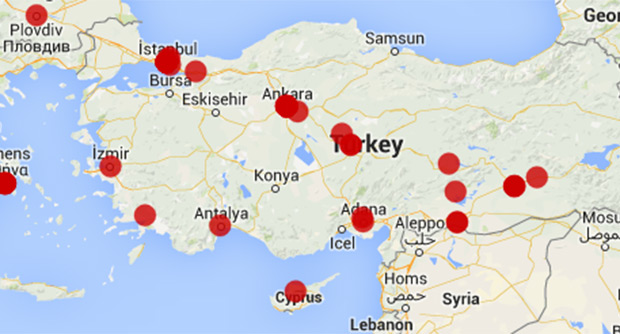
On Sunday, December 14, at least 27 people were detained by Turkish police, including journalists, producers and directors of TV shows and police officers. Arrest warrants were issued for at least 31.
The offices of the newspaper Zaman and of the television network Samanyolu TV were raided by police. A warrant for the arrest of Zaman editor in chief Ekrem Dumanlı was at first incomplete, prompting police to return later on Sunday to arrest Dumanlı. Hidayet Karaca, manager of Samanyolu TV, was also detained, as well as Samanyolu producer Salih Asan and director Engin Koç, who were arrested in the city Eskişehir. Warrants were also issued for Makbule Çam Alemdağ, a writer for a Samanyolu show, and Nuh Gönültaş, a columnist for the newspaper Bugün. Bianet has published a list of those detained yesterday.
A large group of protesters gathered outside of Zaman’s Istanbul offices, holding signs that read “Free press cannot be silenced”.
Zaman and Samanyolu TV have been singled out by Turkish President Erdogan for being part of what Erdogan calls a “parallel structure” affiliated with exiled cleric Fethullah Gülen. Erdogan has accused Gülen of being at the centre of plots to topple the government.
The prosecutor in charge of Sunday’s operation said that those detained are being charged with involvement in a terrorist organisation, while some are accused of fraud and slander.
The raids were announced by the Twitter user “Fuat Avni” (a pseudonym) on December 13. Fuat Avni tweeted a list of 47 people for whom there would be arrest warrants.
On Monday Turkish President Recep Tayyip Erdogan attacked the European Union for criticising the arrests that targeted opposition media outlets, telling the EU to “mind its own business.”
“The European Union cannot interfere in steps taken … within the rule of law against elements that threaten our national security,” Erdogan said in a televised speech. “They should mind their own business,” he added, in his first comments after Sunday’s raids.
EU foreign policy chief Federica Mogherini and enlargement commissioner Johannes Hahn on Sunday condemned police raids as going “against the European values” and said they were “incompatible with the freedom of media, which is a core principle of democracy.”
Recent media freedom violations from Turkey via mediafreedom.ushahidi.com:
EU project overshadowed by arbitrary media ban
BirGün newspaper to undergo investigation for critical coverage
Journalists assaulted, prevented from photographing
Economist and Taraf correspondent threatened on Twitter
Journalist sentenced to community service for insult
This article was updated on 15 December 2014 at indexoncensorship.org
This article was originally and updated at mediafreedom.ushahidi.com on 15 December 2014
11 Dec 2014 | Magazine, Volume 43.03 Autumn 2014
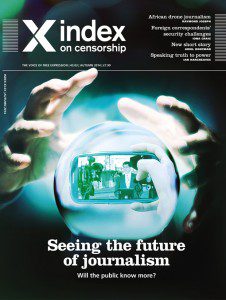
Index on Censorship autumn magazine
In September, Index on Censorship magazine launched a social media campaign which invited its readers to nominate a place which was symbolic of either free speech or censorship, with the winning locations being granted free access to the magazine app for one year.
Nominations came from all over the world and the winning places are Maiden Square in Ukraine, Gezi Park in Turkey and Wigan Pier in the north of England.
You can access the app on iPhone or iPad until 1 September 2015 at any of the three locations listed, by following these steps:
1) Visit the app store or iTunes, searching “Index on Censorship”
2) Download the FREE Index on Censorship app
3) Scroll through the issue to the final page, selecting “Tell me more”
4) Turn the “ByPlace” switch to the right
5) Click OK to activate
See some of the nominations Index magazine received in our Storify below.
For more information on subscribing to Index, click here.
7 Nov 2014 | Europe and Central Asia, News, Turkey
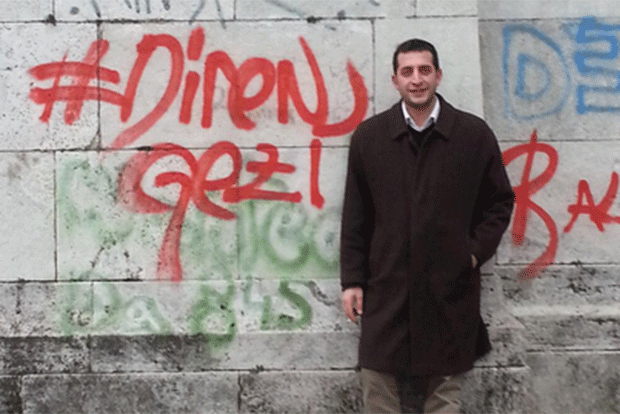
Kemal Göktaş (Photo: @kemalgoktas)
A Turkish journalist was charged on Tuesday for “insulting a public official“.
Kemal Göktaş, a reporter for Turkish paper Milliyet, faces up to two years and four months in prison for criticising the sentence of a police officer who beat a woman in custody. The victim called for eight years imprisonment, but the officer was handed down a one-year jail sentence.
Göktaş’s last article on the case appeared on Milliyet’s website on 6 October. He told Agos that his case is not only a violation of press freedom, but also a human rights violation. He is will testify on 14 November.
In 2009, Göktaş was acquitted of similar charges after publishing articles criticising “general surveillance permission“.
The incident was reported to mediafreedom.ushahihi.com, Index on Censorship’s media violations mapping project.
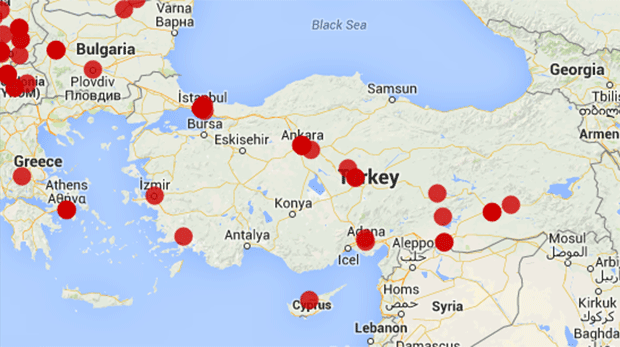
This article was originally posted on indexoncensorship.org
31 Oct 2014 | Europe and Central Asia, News, Turkey
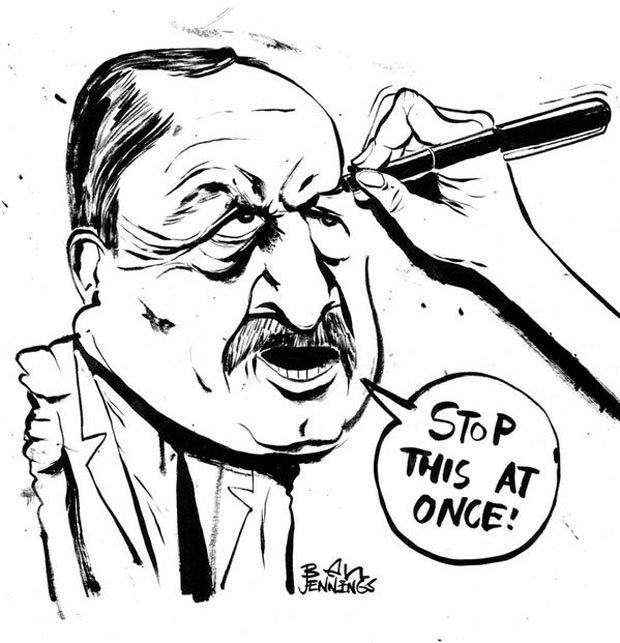
Cartoonists like Ben Jennings rallied around Musa Kart when he faced jail over a caricature of Turkey’s President Erdogan (Credit: Ben Jennings)
Not long ago Turkish cartoonist Musa Kart faced the prospect of spending nine years behind bars, simply for doing his job.
Taken to court by the Turkey’s President (and former Prime Minister) Recep Tayyip Erdogan himself, Kart last week stood trial for insult and slander over a caricature published in newspaper Cumhuriyet in February. Commenting on Erdogan’s alleged hand in covering up a high-profile corruption scandal, the cartoon depicted him as a hologram keeping a watchful eye over a robbery.
While Kart was finally acquitted last Thursday, his case was just starting to hit international headlines — in no small part due to the swift reaction from colleagues around the world. In the online #erdogancaricature campaign initiated by British cartoonist Martin Rowson, his fellow artists shared their own drawings of the president. With Erdogan reimagined as everything from a balloon, to a crying baby, to Frankenstein’s monster, the show of solidarity soon went viral.
“This campaign has showed me once again that I m a member of world cartoonists family. I am deeply moved and honoured by their support,” Kart told Index in an email.
Kart has been battling the criminal charges since February. His defiance was clear for all to see when he told the court on Thursday that “I think that we are inside a cartoon right now”, referring to the fact that he was in the suspect’s seat while charges against people involved in the graft scandal had been dropped.
He remains defiant today: “Erdogan would have either let an independent judiciary process to be cleared or repressed his opponents. He chose the second way,” he said. “It’s a well known fact that Erdogan is trying to repress and isolate the opponents by reshaping the laws and the judiciary and by countless prosecutions and libel suits against journalists.”
This isn’t the first time Kart has run into trouble with Erdogan. Back in 2005, he was fined 5,000 Turkish lira for drawing the then-prime minister as a cat entangled in yarn. The cartoon represented the controversy that surrounded Turkey’s highest administrative court rejecting new legislation that Erdogan had campaigned on.
“I have always believed that cartoon humour is a very unique and effective way to express our ideas and to reach people and it contributes to a better and more tolerant world,” he explained when questioned on where he finds the strength to keep going.
It remains unclear whether the story ends with this latest acquittal decision. While the charges against Kart were dropped earlier this year, an appeal from Erdogan saw the case reopened. “Erdogan’s lawyers will…take the case to the upper court,” he said.
Kart’s experience is far from unique; free expression is a thorny issues in Erdogan’s Turkey. In the past year alone, authorities temporarily banned Twitter and YouTube and introduced controversial internet legislation. Meanwhile journalists, like the Economist’s Amberin Zaman, have been continuously targeted, as Index on Censorship’s media freedom map shows.
Kart is not optimistic about the future of press freedom in his country: “Unfortunately, day by day, life is getting harder for independent and objective journalists in Turkey.”
This article was originally posted on 31 October at indexoncensorship.org





